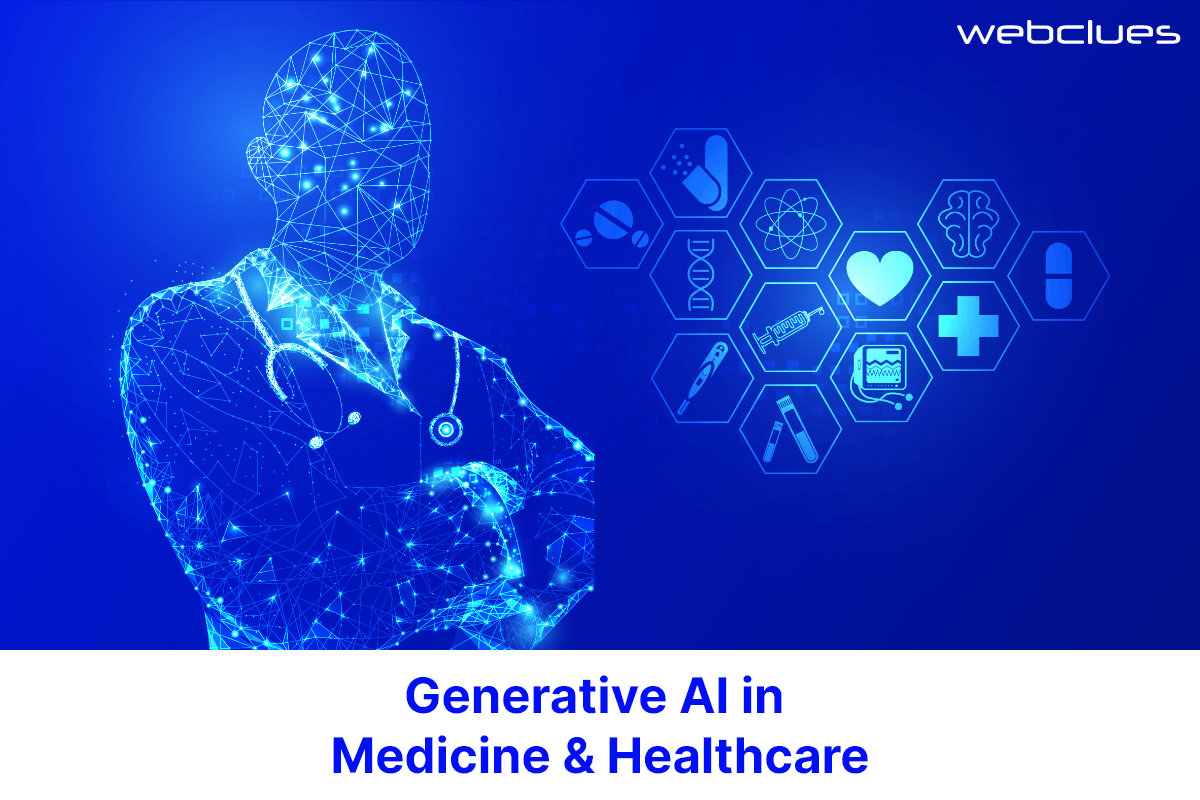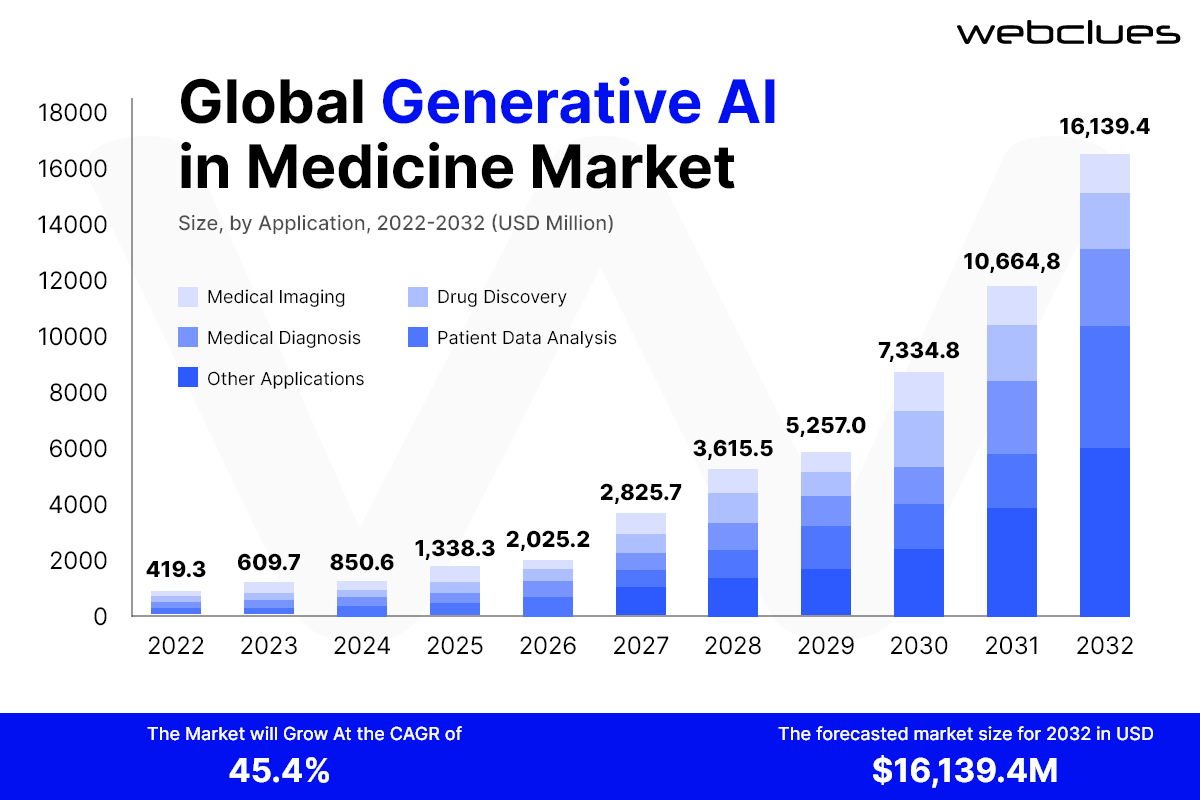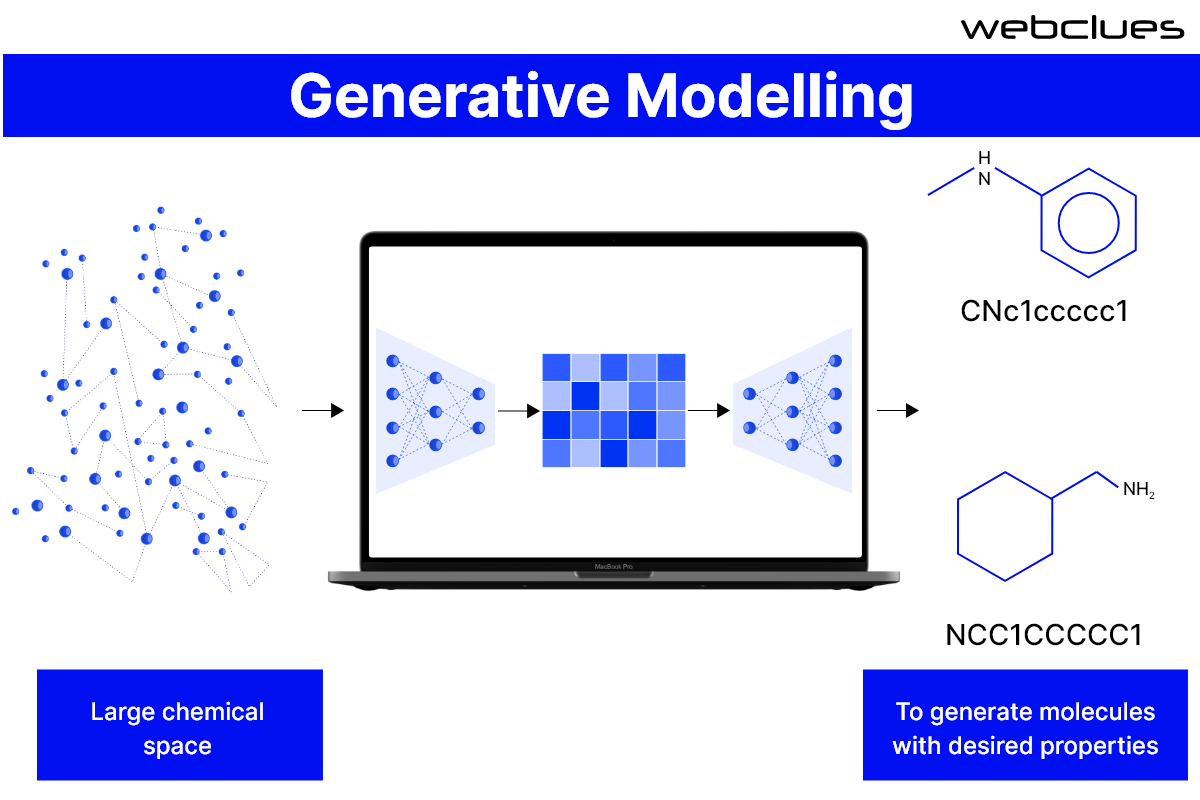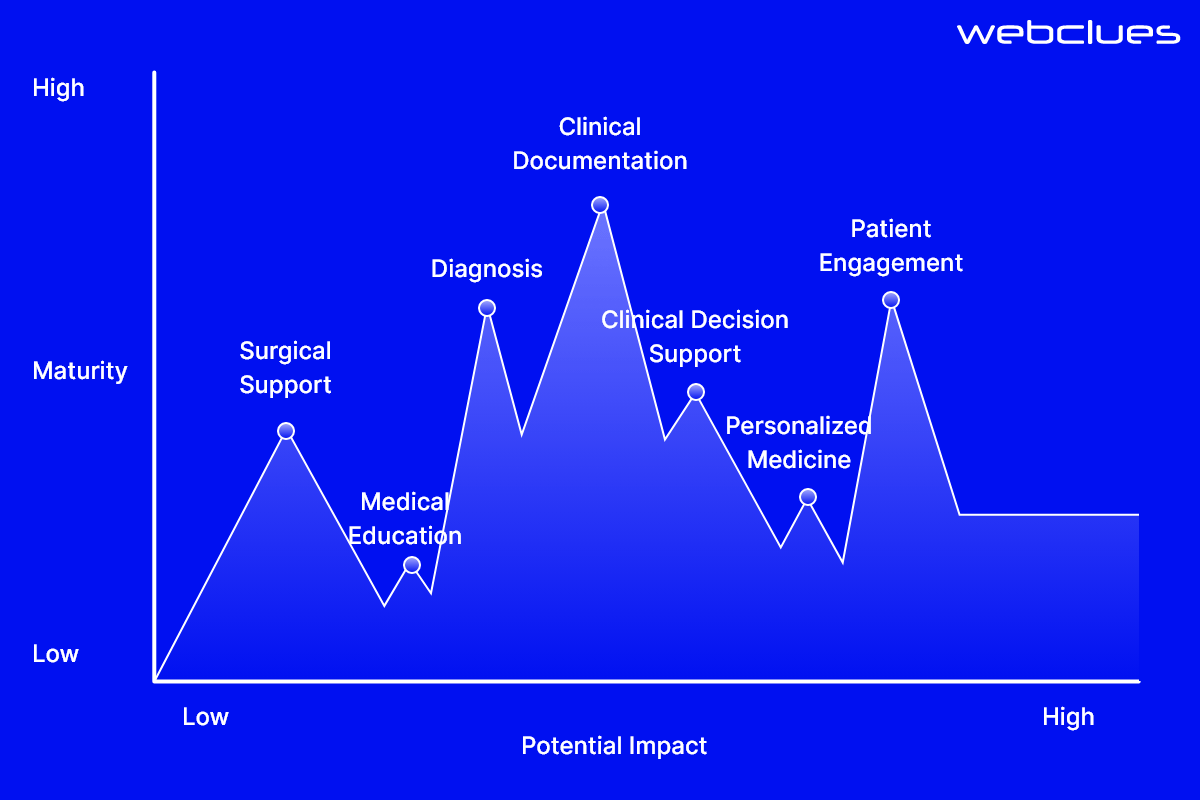Generative AI in Medicine & Healthcare

To say that technology plays a pivotal role in the advancement of medicine & healthcare industry would be an understatement. This is especially true in today’s times when technology is constantly pushing the boundaries of innovation in the realm of healthcare. One such remarkable technology that stands out is Generative AI. Imagine a future where medical diagnoses not just are accurate but also take a significantly lesser amount of time, where drug discovery is not confined to years of research but can happen in a matter of few weeks, and where treatment plans are personalized to match the unique genetic makeup of each individual. This future is no longer a distant dream but is rather becoming a reality with the integration of Generative AI in healthcare.
If you are curious about what is Generative AI, it is a subset of artificial intelligence that can generate novel content in multiple modalities, including text, images, videos, code, and even several complex structures. It has taken the healthcare industry by storm, as like traditional AI, it does not depend on predefined rules and datasets to produce new content. Generative AI’s extraordinary capabilities can open up a myriad of possibilities for enhancing medical research, diagnostics, treatment development, and more.

In this blog, we will discuss some of the current and potential use cases of Generative AI for medical applications, such as drug discovery, medical imaging, and personalized medicine, among others. We will also address some of the challenges of applying the technology in the domain, along with potential solutions.
Notable Applications of Generative AI in Healthcare
There are numerous applications of Generative AI in medicine & healthcare – one of the most vital and impactful domains of human well-being. Let’s explore a few of the most game-changing ones of them.
Drug Discovery
Drug discovery is among the most promising ways Generative AI is transforming healthcare. The process involves finding new molecules or compounds that possess the required properties or effects, such as targeting specific diseases or reducing side effects. The challenge with drug discovery is that it is a complicated, expensive, and time-consuming process and comprises numerous steps, such as screening, synthesis, testing, and optimization.
Generative AI, however, can accelerate and improve the process of drug discovery by helping design novel molecules or compounds that are diverse as well as effective. By utilizing existing data such as chemical structures, biological activities, or molecular properties, it can generate new candidates that match specific criteria or objectives. It can further evaluate the performance or potential of the candidates using various metrics or models and optimize them.

Here are a few examples of successful or promising Generative AI models for drug discovery.
- AlphaFold:
Developed by DeepMind, it is a deep-learning model that can predict the 3D structure of proteins from their amino acid sequences. Protein structure is crucial to understanding the function of proteins and their interaction with other drugs. Essentially, AlphaFold can aid in the discovery of new drugs that bind to particular proteins or targets.
- GENTRL:
Insilico Medicine developed this Generative AI reinforcement learning model to design new molecules, possessing desired molecular activities. It utilizes existing data from public databases or proprietary sources to generate novel molecules that have high scores for certain properties or effects. It is also possible to synthesize and test the generated molecules in the laboratory using GENTRL.
Medical Imaging
Medical imaging is another prominent application of Generative AI in medicine. It is the process of capturing images of the internal structures or organs of the human body, which include X-rays, CT scans, MRI scans, or ultrasound images. It plays a vital role in diagnosing diseases, monitoring treatment progress, and planning surgical procedures.
Generative AI can elevate medical imaging by helping in the generation, manipulation, and improvement of medical scan images. This can help augment the existing data, and improve the quality and clarity of the images. It can also help in better interpretation and understanding of the images. For instance, Generative AI can help with various tasks concerning medical imaging, including image synthesis, segmentation, inpainting, super-resolution, and translation.
Let’s look at some prominent examples of Generative AI models for medical imaging.
- GANs:
There are several tech giants that have developed GAN-based models to improve medical imaging. For instance, NVIDIA developed a model that can help generate high-quality synthetic brain MRI images from text labels. Google created a model to inpaint missing regions of retinal images with realistic details. Facebook has also created a GAN-based model that can translate chest X-rays to CT scans with realistic textures and structures.
- VAEs:
Generative AI can also segment medical scans into different regions or structures, such as organs, tissues, tumors, or lesions. For instance, Microsoft developed a VAE-based model that can segment brain tumors from MRI images with high accuracy and efficiency.
Personalized Medicine
Through personalized medicine, Generative AI can help tailor medical treatment to the individual characteristics of each patient, such as their genetic makeup, medical history, or lifestyle. This way, it can help improve the effectiveness and safety of medical interventions, along with, reducing the cost and time of trial and error.
Generative AI can learn from various sources of data, such as genomic sequences, clinical records, or wearable devices, and generate predictions or recommendations that are specific to each patient. Thus, it can help achieve personalized medicine by allowing the identification of optimal drug dosage, combination, or timing for each patient based on their genetic profile and response to treatment.
Here are a few noteworthy names that are looking to leverage Generative AI to enable personalized medicine.
- Deep Genomics:
It is a biotechnology company striving to discover new therapies for genetic diseases, using Generative AI services. It employs deep learning to model the molecular interactions and effects of genetic variations on human cells. It can thus create and prioritize novel drug candidates that can correct or modify faulty genes or proteins.
- InsightRX:
With an aim to optimize drug dosing and therapy for individual patients, InsightRX, a software platform, uses Bayesian modeling to learn from patient data, such as demographics, biomarkers, or pharmacokinetics. This way, they generate personalized dosing recommendations that can achieve the desired clinical outcomes while minimizing adverse effects.
Natural Language Processing
Nowadays, more and more healthcare facilities and medical institutions are leveraging natural language processing (NLP) by means of Generative AI tools that can understand and generate natural language texts or speech. This way, they utilize NLP to improve communication and information exchange between doctors and patients, and/or among medical professionals.
NLP enables the creation of natural language texts or speech from data, such as images, audio, or structured data, thus helping in the generation of new data for communication or documentation purposes. For instance, utilizing NLP, Generative AI can generate medical reports from images of medical scans, or synthesize speech from text for voice assistants.
Below mentioned are a few remarkable examples of Generative AI models or NLP in healthcare.
- MIMIC–III:
Containing diverse types of data, including demographics, vital signs, laboratory tests, medications, notes, and discharge summaries, MIMIC-III is a large-scale dataset of de-identified electronic health records from intensive care unit patients. It can be used to train generative AI models to generate realistic and coherent medical texts for various purposes, such as summarization, completion, or paraphrasing.
- Google Duplex:
It is a conversational agent that uses Generative AI to make phone calls on behalf of users. With the ability to understand natural language speech and generate natural-sounding speech with human-like intonation and pauses, it can be used to perform tasks such as booking appointments, making reservations, or confirming information.
Bioinformatics
Generative AI can play an essential role in analyzing and interpreting biological data using computational methods – also known as bioinformatics. Using bioinformatics, it becomes possible to uncover the molecular mechanisms and functions of life processes, such as gene expression, protein interaction, or metabolic pathways.
Generative AI can take bioinformatics to the next level by creating models that can learn from biological data, such as DNA sequences, protein structures, or gene networks, and generate new data that can provide insights or hypotheses for biological problems. For instance, Applying Generative AI to bioinformatics can enable the discovery of new biological patterns or motifs from DNA sequences or the generation of synthetic biological sequences that have specific properties or functions.
Popular examples of Generative AI models applied to bioinformatics:
- DeepCpG:
It is a deep learning model that uses Generative AI to predict DNA methylation states from single-cell sequencing data. DNA methylation is a chemical modification of DNA that affects gene expression and regulation, and DeepCpG can generate genome-wide methylation maps for individual cells or cell types by learning from single-cell methylation profiles.
- DeepSynth:
Like DeepCpG, DeepSynth is also a deep learning model, utilizing Generative AI to synthesize DNA sequences with desired functions. It uses VAE to learn from existing DNA sequences and create novel sequences that can be used to design synthetic genes or circuits for biotechnology applications.

Future Perspectives and Emerging Trends in Generative AI in Healthcare
We have already addressed how Generative AI in healthcare is setting the stage for a transformative revolution. As we look ahead, let’s explore the future outlook and some of the emerging trends.
Improved Diagnostics & Precision Medicine:
By helping generate realistic medical images that can detect diseases accurately and quickly, Generative AI can enhance diagnostics and enable precision medicine. For example, a generative AI model called GANsformer can generate realistic chest X-rays that can help diagnose pneumonia.
Collaborative AI and Human-AI Interaction:
Generative AI can foster collaboration between AI and healthcare professionals. Human-AI interaction is important to leverage the strengths of both humans and AI algorithms. However, human oversight and feedback are also essential to ensure the quality and reliability of the generated outputs.
Big Data & Electronic Health Records (EHRs) Integration:
By integrating with Big Data and Electronic Health Records, Generative AI can access vast amounts of patient data and generate valuable insights. For example, a generative AI for healthcare model called Med2Vec can learn meaningful representations of medical concepts from large-scale EHR data, which can help identify patterns, predict outcomes, and optimize treatment strategies.
Multi-Modal Generative AI:
Future trends in generative AI involve exploring multi-modal approaches that can integrate multiple data modalities, such as text, images, videos, code, or even complex structures. By combining different types of data, generative AI models can generate more comprehensive and diverse outputs. It can also create new possibilities for innovation and discovery.
Continual Learning and Adaptive Systems:
Generative AI systems must adapt and learn continually to keep pace with the rapidly evolving healthcare landscape. Future generative AI models will likely incorporate continual learning techniques that enable them to update their knowledge and generate more accurate and relevant outputs over time.
Final Thoughts
Generative AI is transforming healthcare in unprecedented ways, bringing together technology and medicine to create a new paradigm of care. However, this exciting potential also comes with ethical challenges that require careful attention and responsible action. As Generative AI becomes a vital partner in healthcare, we must ensure that innovation is balanced with respect for patient privacy, fairness, and transparency.
Generative AI has the power to speed up research, improve diagnostics, optimize drug discovery, and personalize patient care. But its impact goes beyond these amazing achievements. The ethics of AI usage, data privacy, bias reduction, and the preservation of the human touch are the foundations of the future of AI in healthcare.
At WebClues Infotech, we are dedicated to leveraging the potential of Generative AI while upholding the values that define the healthcare industry. Our Generative AI services are not only cutting-edge but also guided by a deep sense of responsibility. We invite healthcare businesses to explore the possibilities of Generative AI with us – a journey that is driven by innovation and a vision of a healthier tomorrow.
Ready to unlock the potential of Generative AI for your healthcare business? Contact us today and start a journey of innovation and responsible transformation.
Build Your Agile Team
Hire Skilled Developer From Us
Transform the landscape of your healthcare project with Generative AI
At WebClues, we can help you synergize the revolutionary potential of Generative AI in your healthcare business, utilizing our expertise, and a team of skilled Generative AI developers.
Get a QuoteOur Recent Blogs
Sharing knowledge helps us grow, stay motivated and stay on-track with frontier technological and design concepts. Developers and business innovators, customers and employees - our events are all about you.
Contact Information
Let’s Transform Your Idea into Reality - Get in Touch
India
Ahmedabad
1007-1010, Signature-1,
S.G.Highway, Makarba,
Ahmedabad, Gujarat - 380051
Rajkot
1308 - The Spire, 150 Feet Ring Rd,
Manharpura 1, Madhapar, Rajkot, Gujarat - 360007
UAE
Dubai
Dubai Silicon Oasis, DDP,
Building A1, Dubai, UAE
USA
Delaware
8 The Green, Dover DE, 19901, USA
New Jersey
513 Baldwin Ave, Jersey City,
NJ 07306, USA
California
4701 Patrick Henry Dr. Building
26 Santa Clara, California 95054
Australia
Queensland
120 Highgate Street, Coopers Plains, Brisbane, Queensland 4108
UK
London
85 Great Portland Street, First
Floor, London, W1W 7LT
Canada
Burlington
5096 South Service Rd,
ON Burlington, L7l 4X4





